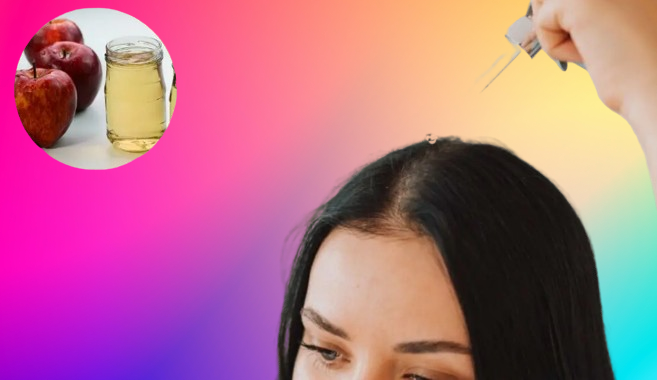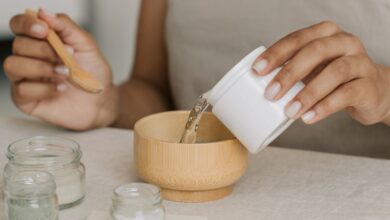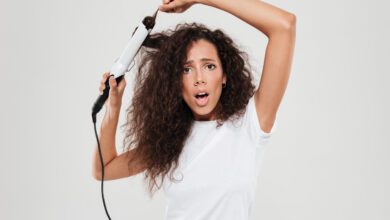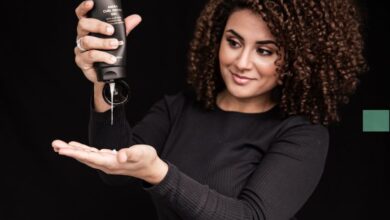Apple Cider Vinegar for Dandruff: Benefits and How to Use It

Flaky scalps and dandruff can irritate one another. Your scalp’s white flakes can give off the wrong impression and give you a persistent itch to scratch your head. Furthermore, if left untreated, it might even result in further hair issues like hair loss.
Fortunately, there are lots of natural treatments available to help prevent dandruff. ACV, which is easily found in kitchens and is made by fermenting apples, can help you take better care of your scalp. A superfood status has also recently been granted to it because of its many health advantages. Is apple cider vinegar beneficial for hair, though?
How Does ACV Aid in Dandruff Reduction?
A type of scalp infection known as dandruff is brought on by yeast or fungi called Malassezia. Having an oily scalp or improper hair washing are the main factors that can cause dandruff. As the yeast grows, it produces itchy residue, redness, and flaky residue by feeding on the oils on the scalp.
Because of its antibacterial qualities, vinegar has been used to treat a wide range of illnesses since ancient times.
ACV can lessen itching and flakiness by assisting in the growth of the yeast that causes dandruff. Because acetic acid helps maintain and restore the pH balance of your scalp, ACV is also acidic.
How Can ACV Help Maintain a Healthy, Irritation-Free Scalp?
ACV hair rinses are the most widely used and straightforward method of treating dandruff in hair. The final step in hair care is rinsing, which helps to balance your scalp. You can either make your own ACV at home by fermenting apples for a few weeks, or you can purchase it from the market.
It is recommended to use the ACV rinse diluted with water rather than straight. This will lessen the possibility of any negative effects. Sometimes using an ACV hair rinse leaves your hair smelling bad. So, if it seems to be bothering you, give it a thorough wash with water.
For Hair, Use Apple Cider Vinegar
There are numerous benefits to incorporating ACV into your hair care regimen in addition to its ability to lessen dandruff.
- Eliminates product buildup: The cleansing qualities of ACV can aid in the removal of product buildup brought on by hair care products. It can aid in de-clogging hair follicles and clearing your scalp.
- Scalp exfoliation: Apple cider vinegar’s enzymes can also eliminate dead cells that have accumulated on your scalp and may be causing flakiness and itching.
- Aid in the switch to organic shampoos: When you move from regular shampoo to an organic, sulfate-free shampoo, your hair goes through a transitional stage that may cause it to become oily and coarse. Rinsing with ACV will facilitate the shift by ridding your scalp of all oil, grease, and debris.
- Enhances sheen: Hair with an alkaline pH may appear frizzy, lifeless, and coarse. Additionally, because ACV is acidic, it helps balance pH levels and makes your hair appear smoother, shinier, and healthier. Additionally, it will lessen friction and breakage, preserving the volume of your hair.
- Promote healthy hair growth: ACV’s general ability to clear our pores, lessen dandruff, and keep our scalps at a healthy pH will all contribute to the promotion of healthy hair growth.
Methods for Applying Apple Cider Vinegar to Hair
- Rinse with ACV to clarify hair: Use one tablespoon of ACV diluted with one cup of water as a hair rinse. Use this ACV rinse on your hair and scalp after shampooing and conditioning it. After giving it a light massage, leave it in your hair for a few minutes, and then rinse it out with water. To get rid of buildup on the scalp, repeat this procedure each time you shampoo your hair.
- ACV for dandruff: Combine 1 tablespoon with 1 cup of water. Transfer this mixture to a spray bottle. After shampooing your hair, spritz the solution all over your scalp. After a few minutes, let it sit and then rinse it with plain water. As usual, follow up with our conditioner.
For extra advantages, you can also use herbs like neem or rosemary leaves as a rinse. After bringing the herbs to a boil, strain them. After letting the water cool, use it to prepare an ACV rinse.




